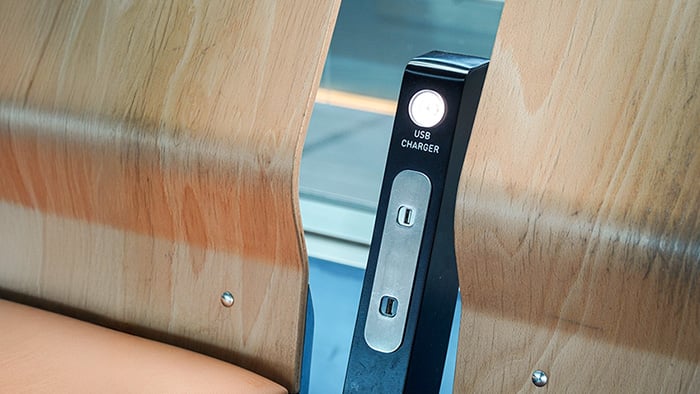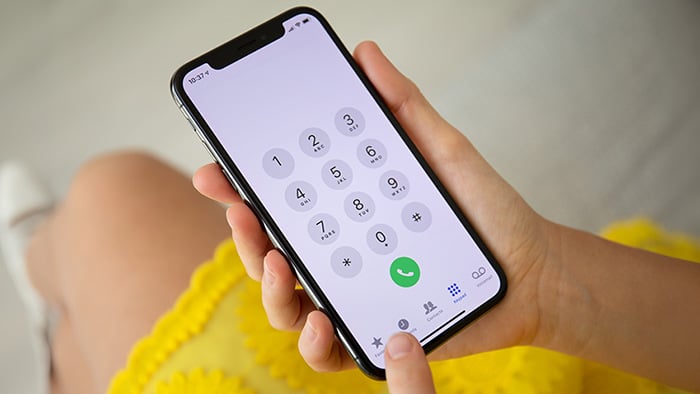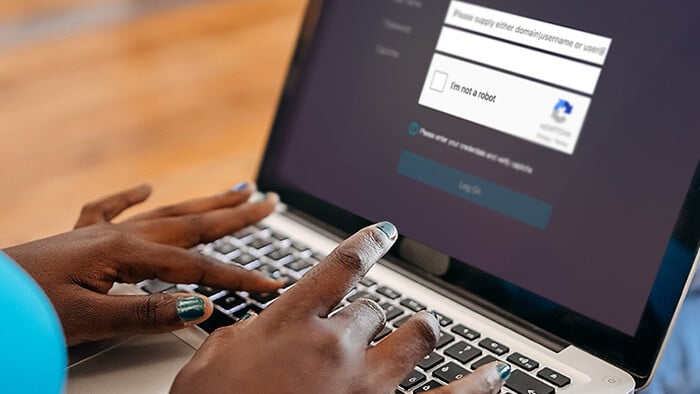Signs your Twitter has been hacked
A compromised Twitter account isn’t just a simple invasion of privacy. It can also lead to a malware infection, fraud, or even identity theft. Fortunately, catching the hack early can help limit the fallout.
Here are some telltale signs of a hacked Twitter account:
Unauthorized tweets that may include spam links
If you see a tweet from your account that you didn't send, that’s an immediate red flag. Hackers often tweet out phishing links to trick followers of the hacked account into compromising their security, too. This is a particularly effective strategy for celebrity accounts with lots of followers, but it can happen to anyone.
You should also learn to recognize when other Twitter accounts have been hijacked by cybercriminals to avoid clicking any suspicious links. If someone you follow suddenly starts posting uncharacteristic tweets or spam links with promises of instant weight loss, massive earnings, or other strange-sounding clickbait, it could be the result of a Twitter hack.
Strange messages, follower activity, or app activity
Hackers may also tamper with your Twitter account in other ways, so watch out for dramatic increases or decreases in your number of followers, unexpected messages with suspicious links, or any other unusual activity on your Twitter account.
A hacker gaining access to your account might:
-
Follow or unfollow a large number of accounts
-
Send out DMs without authorization
-
Tweet without your knowledge
-
Block other users
-
Authorize apps for third parties without your permission
Unexpected activity notifications
To help protect you from identity theft, Twitter alerts you if it detects unexpected activity on your account. But if you don’t check your Twitter account regularly, it could be too late by the time you notice a hack. Pay attention and take immediate action to secure your Twitter account if you receive unexpected activity notifications alerting you to:
-
Unauthorized login attempts
-
Login attempts from a new device
-
Login attempts from an unusual location
-
Suspicious activity resulting in your account being locked
Check your email
In addition to in-app notifications, pay attention to official emails from Twitter about unusual activity on your account. If you aren’t a regular user, this Twitter hacking sign is particularly important to look out for.
Twitter sends a warning email when details associated with your Twitter account, such as your email or username, are altered. If you didn’t make these changes yourself, it could be because your Twitter’s been hacked and your email changed.
But check that the email is really from Twitter, because spam emails and email-based scams for Amazon, Twitter, and other e-commerce and social media platforms are common.
Check your login activity
If you suspect your Twitter account has been hacked, check your login activity. Follow the steps below to review the list of devices that actively logged into your account, including their locations:
-
Tap your profile in the Twitter app, or click More in the left-side menu on desktop.

-
Choose Settings and Support, then click Settings and privacy.

-
Go to Security and account access and select Apps and sessions.

-
Select Account access history to see when, where, and how your account was accessed.

How do Twitter accounts get hacked?
Different types of hackers use different techniques to gain access to other people’s accounts. If you think your phone has been hacked, or if you discover your Twitter account’s been hacked, you need to act quickly.
Here are common methods used for hacking Twitter and other social media accounts:
-
Using your personal information.
Hackers can spoof your phone number and use social engineering to find out personal information that can be used to hack your account.
-
Phishing scams.
Following a suspicious link or entering your personal information on a scam website can give hackers backdoor access to your Apple ID or your Twitter login information.
-
Weak or reused passwords.
Hackers can brute force weak passwords or exploit reused passwords that have leaked onto the dark web via a data breach.
-
Malware.
If a hacker installs a Trojan app or other form of malware on your device, they can use keyloggers or other spyware tools to harvest your login credentials.
-
Man-in-the-middle attacks.
Unless you’re using a VPN to encrypt the data you send and receive, using public Wi-Fi or other unsecured networks can leave your internet connection vulnerable to eavesdropping man-in-the-middle attacks.
How do I fix a hacked Twitter account?
If your Twitter account has been hacked, don’t panic. There are several ways to recover and secure your Twitter account.
Here are the most important steps to take if your Twitter has been hacked:
Reset your Twitter password
The simplest way to regain control of your account is to change your password — a Twitter password reset will lock the hacker out.
Resetting your Twitter password while logged in
If you still have access to your Twitter account, you can follow these steps to reset your password while logged in:
-
Log into your Twitter account and click More on the drop-down menu on the left.

-
Click Settings and Support followed by Settings and privacy.

-
Click Your account, then select Change your password.

-
Enter your current password followed by your new password.

Resetting your Twitter password via email or SMS
Even if a hacker temporarily locked you out of your account by changing your password, it’s still possible to reset your password without logging in. You can do this via email or text message. Here’s how:
-
Click Forgot password? on the Twitter login page, then find your account by entering your email, phone number, or username.

-
Select where you want to receive the confirmation code, tap Next, then enter the code on the next screen.

-
Enter a new password to finish resetting your account. Make sure to choose a strong password. Then, log in normally with your new credentials.
Report to Twitter
If a hacker already changed your password and your recovery email or phone number, things are trickier. But you can still regain access to your account by reporting the hack to the Twitter Help Center and following their process for recovering or reactivating your account.
As in any case of online fraud, it’s important to report internet scams and hacks immediately to give yourself the best possible chance of resolving the issue and help prevent others from falling victim to the same ploy.
Ensure the security of the email linked to your account
If a hacker has access to your email address, they can easily regain access to your Twitter account. So be sure to verify your email account is secure. The best way to do this is by choosing a new, strong, and unique password for your email account.
Then help keep your passwords secure with a powerful data breach monitoring tool like Avast BreachGuard.
Scan your devices for viruses
If your Twitter account hack was the result of malware lurking on your device, you’ll remain exposed to further hacks until you remove it. To find and remove malware from your PC, get rid of a virus on your Android, or clean up an iPhone infection, download top-rated antivirus software and run a scan to identify and help flush out security threats.
How to protect your Twitter account from hacks
Whether your account was hacked in the past or you want to protect against a Twitter account hack in the future, here are the best steps you can take to keep your Twitter account safe from hackers.
Enable two-factor authentication
Enabling two-factor authentication (2FA) on Twitter makes it much more difficult for anyone to hack your account, because every login needs to be verified by entering a code received via text or an authentication app.
To start using 2FA, sign into your Twitter account, go to Settings and privacy > Security and account access > Security > Two-factor authentication, and set up the verification method according to your preferences.

Use a strong password
Hackers can guess weak passwords using cracking techniques. Choose a long and unique password — a randomly generated password or passphrase is the best option. Don’t reuse passwords for your Twitter account that you use elsewhere.
Don't share your password
Your password should never be shared with anyone or written down where somebody could access it. Using a secure password manager is a great way to keep track of all your passwords. If you suspect someone else has access to your password, change it immediately.
Keep your devices secure
Use security software to safeguard your devices and check them regularly for malware, viruses, or spyware using a malware removal tool or virus removal tool. You should also make sure all your programs and operating systems are updated to ensure you have the latest security patches.
Don't click random links
Think twice before clicking a link in an email, text message, or on social media. Scams are everywhere, and phishing is a common tactic for hackers. Double-check that you’re looking at a trusted source before following a link.
Make sure you’re on Twitter’s actual website
Spoof websites posing as legitimate websites are a common method for pharming login details or other personal information. Double-check that the website is really Twitter before entering your username and password. A great way to avoid unsafe websites is to use a secure browser that alerts you to unsafe or fake sites.
Beware of third-party apps
Many third-party social media management apps offer great benefits, but if you don’t know how to spot and avoid fake apps, they can give hackers a backdoor into your device and online accounts. Take the time to check reviews before downloading a third-party app or entering your login information there.
Monitor the web for data leaks
Keep an eye out for information about data leaks or data breaches that could expose your personal information, passwords, or account details. If your personal login details are leaked, change them as soon as possible to ensure the security of your Twitter account.
Keep your online accounts safe and secure
Twitter is a highly trusted social media platform and boasts strong security that protects its users’ data. But like pretty much anything online, Twitter can still be hacked — especially if cybercriminals get their hands on your login details.
Along with protecting against data leaks and third-party data collection, Avast BreachGuard helps you regain control of data that’s already out there. And it scans the darkest corners of the web for signs of a breach to help you take action to secure your accounts before it’s too late.
FAQs
Can you get hacked on Twitter?
Yes, although Twitter is a highly secure and trusted platform that implements a high standard of security, it’s possible to have your Twitter account hacked. Twitter hacks can occur when hackers acquire your personal information via data breaches or phishing, but they can also be the result of malware or brute force attacks.
Why has my Twitter been hacked?
It’s unlikely your account has been singled out specifically — hackers are generally opportunistic cybercriminals. If your Twitter account’s been hacked, it could be because your data was compromised in a data breach, you were caught up in a widespread phishing campaign that resulted in a stolen password, or spyware made its way onto your device.
How do I recover my Twitter account?
To recover your Twitter account, reset your password. If you still have access to your account, do this by going to More > Settings and privacy > Your account > Change your password. If you can’t access your account, click Forgot password? on the Twitter login page and follow the steps, or visit the Twitter Help Center.
Can you get hacked by opening a DM on Twitter?
A hacker can't gain access to your account if you just open a DM — but if you click an infected link in that DM, it’s a different story. Hackers often use phishing tactics in Twitter DMs and other social media platforms to spread malware or harvest login details. Never click a link in a Twitter DM, or anywhere else, if it seems suspicious or you don’t trust the source.
What was the biggest Twitter hack ever?
The biggest Twitter hack to date took place in July 2020, when 130 Twitter accounts belonging to influential public figures — including Elon Musk, Bill Gates, Joe Biden, and Kim Kardashian — were hacked and used to promote a Bitcoin-related scam that promised to double money sent to a linked cryptocurrency wallet. Hundreds of people fell for the scam before Twitter was able to remove the tweets and restore the accounts.























